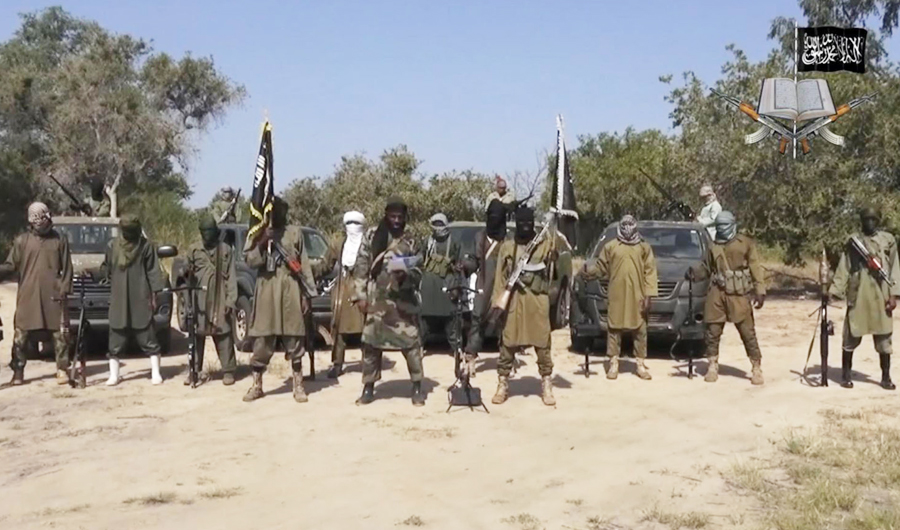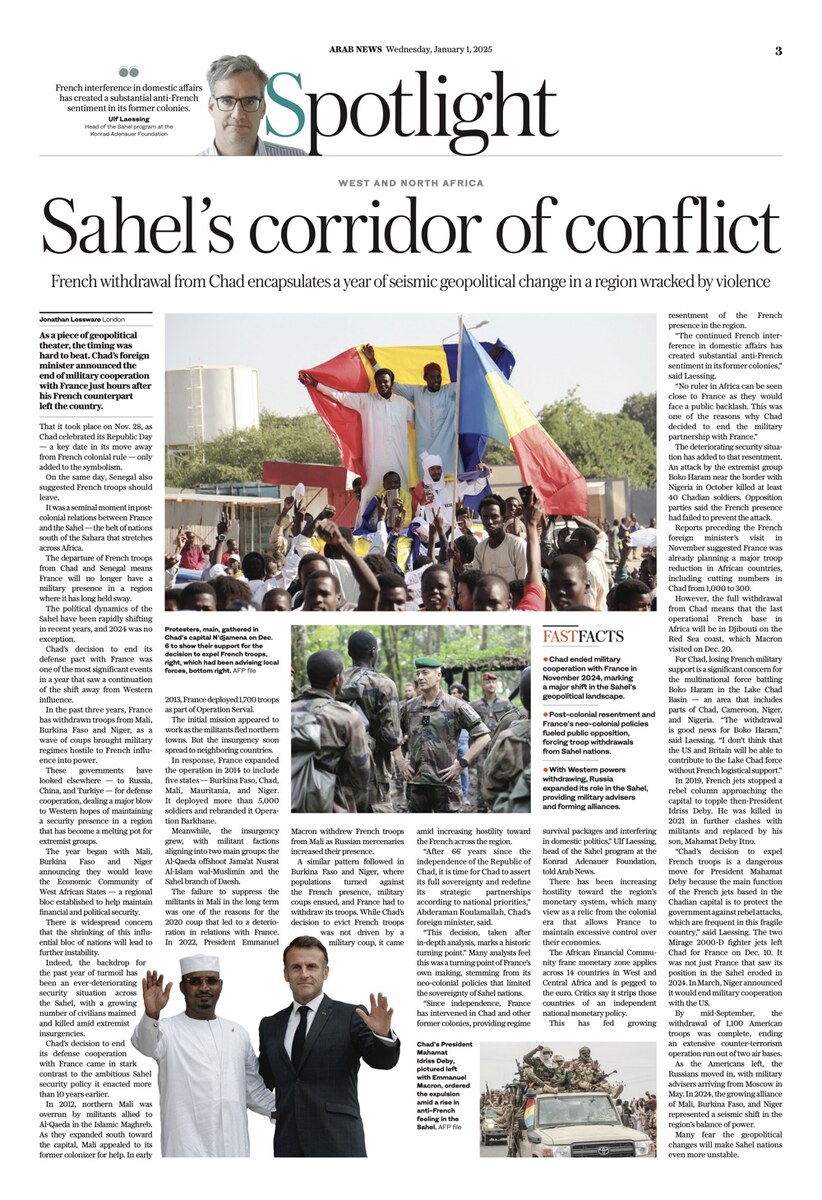LONDON: As a piece of geopolitical theater, the timing was hard to beat. Chad’s foreign minister announced the end of military cooperation with France just hours after his French counterpart left the country.
That it took place on Nov. 28, as Chad celebrated its Republic Day—a key date in its move away from French colonial rule—only added to the symbolism.
On the same day, Senegal also suggested French troops should leave.
It was a seminal moment in post-colonial relations between France and the Sahel—the belt of nations south of the Sahara that stretches across Africa.
The departure of French troops from Chad and Senegal means France will no longer have a military presence in a region where it has long held sway.

While Chad’s decision to evict French troops was not driven by a military coup, it came amid increasing hostility toward the French across the region. (AFP/File)
The political dynamics of the Sahel have been rapidly shifting in recent years, and 2024 was no exception.
Chad’s decision to end its defense pact with France was one of the most significant events in a year that saw a continuation of the shift away from Western influence.
In the past three years, France has withdrawn troops from Mali, Burkina Faso and Niger, as a wave of coups brought military regimes hostile to French influence into power.
These governments have looked elsewhere—to Russia, China, and Turkiye—for defense cooperation, dealing a major blow to Western hopes of maintaining a security presence in a region that has become a melting pot for extremist groups.
The year began with Mali, Burkina Faso and Niger announcing they would leave the Economic Community of West African States (ECOWAS)—a regional bloc established to help maintain financial and political security.

French soldiers from the Barkhane force stand at the Barkhane tactical command center in N'Djamena. (AFP/File)
There is widespread concern that the shrinking of this influential bloc of nations will lead to further instability.
Indeed, the backdrop for the past year of turmoil has been an ever-deteriorating security situation across the Sahel, with a growing number of civilians maimed and killed amid extremist insurgencies.
Chad’s decision to end its defense cooperation with France came in stark contrast to the ambitious Sahel security policy it enacted more than 10 years earlier.
In 2012, northern Mali was overrun by militants allied to Al-Qaeda in the Islamic Maghreb. As they expanded south toward the capital, Mali appealed to its former colonizer for help. In early 2013, France deployed 1,700 troops as part of Operation Serval.
The initial mission appeared to work as the militants fled northern towns. But the insurgency soon spread to neighboring countries.

Boko Haram members. (X)
In response, France expanded the operation in 2014 to include five states—Burkina Faso, Chad, Mali, Mauritania, and Niger. It deployed more than 5,000 soldiers and rebranded it Operation Barkhane.
Meanwhile, the insurgency grew, with militant factions aligning into two main groups: the Al-Qaeda offshoot Jama’at Nusrat Al-Islam wal-Muslimin and the Sahel branch of Daesh.
The failure to suppress the militants in Mali in the long term was one of the reasons for the 2020 coup that led to a deterioration in relations with France. In 2022, President Emmanuel Macron withdrew French troops from Mali as Russian mercenaries increased their presence.
A similar pattern followed in Burkina Faso and Niger, where populations turned against the French presence, military coups ensued, and France had to withdraw its troops.
FASTFACTS
• Chad ended military cooperation with France in November 2024, marking a major shift in the Sahel’s geopolitical landscape.
• Post-colonial resentment and France’s neo-colonial policies fueled public opposition, forcing troop withdrawals from Sahel nations.
• With Western powers withdrawing, Russia expanded its role in the Sahel, providing military advisers and forming alliances.
While Chad’s decision to evict French troops was not driven by a military coup, it came amid increasing hostility toward the French across the region.
“After 66 years since the independence of the Republic of Chad, it is time for Chad to assert its full sovereignty and redefine its strategic partnerships according to national priorities,” Abderaman Koulamallah, Chad’s foreign minister, said.
“This decision, taken after in-depth analysis, marks a historic turning point.”
Many analysts feel this was a turning point of France’s own making, stemming from its neo-colonial policies that limited the sovereignty of Sahel nations.
“Since independence, France has intervened in Chad and other former colonies, providing regime survival packages and interfering in domestic politics,” Ulf Laessing, head of the Sahel program at the Konrad Adenauer Foundation, told Arab News.

Protesters wave Chadian flags during an anti-France demonstration in N'djamena. (AFP/File)
There has been increasing hostility toward the region’s monetary system, which many view as a relic from the colonial era that allows France to maintain excessive control over their economies.
The African Financial Community (CFA) franc monetary zone applies across 14 countries in West and Central Africa and is pegged to the euro. Critics say it strips those countries of an independent national monetary policy.
This has fed growing resentment of the French presence in the region.
“The continued French interference in domestic affairs has created substantial anti-French sentiment in its former colonies,” said Laessing.
“No ruler in Africa can be seen close to France as they would face a public backlash. This was one of the reasons why Chad decided to end the military partnership with France.”
The deteriorating security situation has added to that resentment. An attack by the extremist group Boko Haram near the border with Nigeria in October killed at least 40 Chadian soldiers. Opposition parties said the French presence had failed to prevent the attack.
Reports preceding the French foreign minister’s visit in November suggested France was already planning a major troop reduction in African countries, including cutting numbers in Chad from 1,000 to 300.
However, the full withdrawal from Chad means that the last operational French base in Africa will be in Djibouti on the Red Sea coast, which Macron visited on Dec. 20.
For Chad, losing French military support is a significant concern for the multinational force battling Boko Haram in the Lake Chad Basin—an area that includes parts of Chad, Cameroon, Niger, and Nigeria.

General Thierry Burkhard, French Army Chief of the Defence Staff, talks on April 15, 2022 to a group of soldiers from Cameroon, Chad. (AFP/File)
“The withdrawal is good news for Boko Haram,” said Laessing. “I don’t think that the US and Britain will be able to contribute to the Lake Chad force without French logistical support.”
In 2019, French jets stopped a rebel column approaching the capital to topple then-President Idriss Deby. He was killed in 2021 in further clashes with militants and replaced by his son, Mahamat Deby Itno.
“Chad’s decision to expel French troops is a dangerous move for President Mahamat Deby because the main function of the French jets based in the Chadian capital is to protect the government against rebel attacks, which are frequent in this fragile country,” said Laessing.
The two Mirage 2000-D fighter jets left Chad for France on Dec. 10.
It was not just France that saw its position in the Sahel eroded in 2024. In March, Niger announced it would end military cooperation with the US.
By mid-September, the withdrawal of 1,100 American troops was complete, ending an extensive counter-terrorism operation run out of two air bases.
As the Americans left, the Russians moved in, with military advisers arriving from Moscow in May.

Chadian and French flags are seen at the Base Aerienne Projetee, also called air base 172 Chief Sergeant Adji Kossei, in N'Djamena. (AFP/File)
In 2024, the growing alliance of Mali, Burkina Faso, and Niger represented a seismic shift in the region’s balance of power.
As violence surged, a record 7,620 people were killed in the Sahel in the first six months of 2024—a 9 percent increase from 2023 and a staggering 190 percent rise from 2021.
Many fear the geopolitical changes in the region will make Sahel nations even more unstable.
With little hope of political or military solutions, the conflicts are likely to persist, leaving vulnerable populations in greater peril in the year ahead.
























